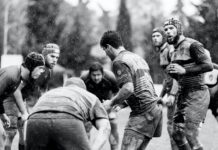Sales management is the weak link in the revenue chain.
Sorry if that offends anyone but it’s the truth. Leadership sets the tone and creates the focus in every organization; and culture is nothing more, nothing less, than the behavior of the leaders. Sales meetings often reveal short-term or lazy mindsets and sadly waste the time of most of the participants.
First a confession. I’ve held roles as sales manager and director of sales for public corporations and then Managing Director of global technology companies where I ran the Asia-Pacific region. I’ve been part of the problem in years past so this is a mirror just as much as a floodlight.
We all need to recognize that we cannot manage by results; only by activities and actions. If your sales meetings are dominated by the CRM on the big screen and blowtorch accountability sessions on forecast commits, then you’re focused on the wrong thing.
“83% of sales management metrics do not measure sales activities” – Jason Jordan, Cracking The Sales Management Code
In a group setting we need to inspire, educate and create the right focus. Individuals need to be encouraged to share their wisdom with others. Publicly embarrassing anyone is a sales meeting is a form of bullying. Weekly one-on-one sessions are where strong accountability should be driven and direct feedback given but even these private sessions are not the forum for any Gordon Ramsay style of coaching. There are no excuses for bullying… ever!
It’s almost always a mistake to fire-up the blowtorch and apply pressure to your sales people to go and explode a deal by applying clumsy pressure or making ill-conceived discount
offers or announcing hollow threats. Instead acknowledge that opening is far more important than closing and that understanding the customer’s timing and process is how to achieve accurate forecasting. We should always be asking the right questions of sales people at the beginning of the quarter and help them identify and execute the right actions that create progression. Applying the flame-thrower with just days to go in the quarter after neglecting the inputs that create success is a sure-fire way to damage relationships and drive-down price and margin. Pic in this paragraph by Jeff Warren (mike-lin-blowtorch).
In a sales meeting; by all means discuss key deals if multiple stakeholders are there and the group can contribute or learn. Here are some important principles for making sales meetings an effective use of everyone’s time:
- Motivate and inspire by celebrating success with individuals and recognize those who are over-achieving in their KPIs that ultimately create revenue. Highlight corporate wins and new customers. Always emphasize team effort along with the commitment of key individuals.
- Ensure that your marketing team is part of sales meetings and that you drive sales and marketing alignment and collaboration. This is a critical success factor for strategic social selling where sales people are content amplifiers and potential content creators. Sales people can learn from marketing to improve their messaging and branding on platforms such as LinkedIn.
- Collaboratively share market intelligence concerning competitor activity and tactics. Insights from both loss reviews and win review insights should be shared including trigger events that created interest with prospects early and then workshop how to create the most powerful conversations.
- Foster information sharing and train a skill or technique that can help people improve their skills to drive results. Invite a guest to speak or present briefly create better understanding of other parts of the business or how to best engage with partners.
I phoned a fellow sales leader, Wayne Moloney and asked
him for his thoughts as he just published an excellent book on sales management and here are his thoughts. He agreed with my list and offered additional thoughts.
Sales meetings should be about the team, not an individual, and meeting should be more about the customer than your company. The objective should be to ensure consistent communication of company messages.
Consider the teams overall performance and address any issues to get back on track. Seek feedback on what assistance the team needs to over-achieve their targets but don’t allow this to become a complaint session. Provide the team with something of value to help them succeed and be specific. Share examples of how a sale was won.
The meeting agenda should not be around the performance of individuals and limit it to one hour. Always start and finish on time. Don’t get stuck in a rut, change the order around and don’t have the same people talking each week. Ask one sales person each week to share something they have tried that’s working for them. It could be a way of getting into a new account, a way of presenting a new service/application (max 15 minutes including questions).
Ask individuals to present on a competitor or a new product, service, technology, process or solution. This will enable the manager to assess their skills and provide feedback and coaching later.
Tip of the Week – the sales managers chance to earn some ‘street cred’. Identify a weakness and provide suggestions on how to address, provide some market intelligence that they would not be aware of and could help them address a problem. It doesn’t need to be complex, just a positive to finish the meeting and help them leave thinking they got something they wouldn’t have if they didn’t attend.
Wayne’s book is excellent and the key point in all of this from me and Wayne is that sales meetings should inspire, educate and equip sales people to execute better with customers. Sales meeting should foster collaboration and serve the sales team, not the sales manager. Wasting everyone’s time going through individual deals may help the manager avoid 1:1 sessions with sales people but it’s not best practice. If you run forecast updates then call the meetings exactly that. Preserve the title of ‘sales meeting’ for sessions that sales people want to attend and that provide value for all in attendance.
And now… the classic movie sales meeting from Glengarry Glen Ross with alec Baldwin.


































